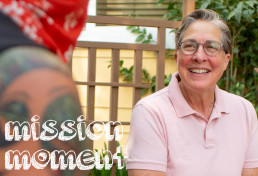As COTS’ CEO, each month I take a moment to consider what I want our community to know about our organization and our progress in serving Sonoma County’s homeless. I look forward to sharing these thoughts with you in this Virtual Cup of Coffee – my monthly communique about the business and mission moments of COTS (Committee On The Shelterless).
My best,
Chuck

Equity and Homelessness
People experiencing homelessness are some of the most disadvantaged in our communities. And Black, Indigenous, and People of Color (BIPOC) suffer more vulnerabilities and poverty that put them at a higher risk of homelessness. Nationally, Black people comprise 13% of the general population and 26% of those living in poverty. Yet, of the estimated 557,000 people currently experiencing homelessness in the U.S., 40% are Black. Overall, Black people are five times more likely to experience homelessness than White people, and Native Americans are four times more likely to experience homelessness than White people.
In Los Angeles County, of the estimated 66,000 people experiencing homelessness, 34% are Black. In San Francisco, of the estimated 8,800 people experiencing homelessness, 37% are Black. And in Sonoma County, of the 2,745 estimated homeless, 36% identified as Multi-Race/Other, Black, American Indian/Alaskan Native, and Pacific Islander/Asian.
Our fellow human beings struggle every day with the things that many of us take for granted – access to health care, housing, quality education, good jobs. If Equity means fairness and justice in the way people are treated, then our responsibility as homeless service providers is to help correct these imbalances across our human services, health, and economic systems. So how do we do that?
One start is to conduct an audit of our homeless system of care in Sonoma County – how we assess, prioritize, and house people experiencing homelessness; our system for creating policy and making decisions; our Strategic Plan and goals set forth by County leaders and by Housing and Urban Development (HUD); how we collect and analyze data and report outcomes; and training programs offered to service providers – all through the lens of Racial Equity.
For example, one policy that directly impacts COTS every day is the Coordinated Entry System (CES), and specifically, the assessment tool used to prioritize and get people into shelter and housing. That tool is a seven-page assessment called Vulnerability Index & Service Prioritization and Decision Assistance Tool (VI-SPDAT). There are no questions that ask about race, ethnicity, or other inequities impacting disenfranchised communities (including LGBTQ+) that would affect access to housing and determine interventions for homeless subpopulations. CES refers only those with the highest VI-SPDAT scores (the most vulnerable) which, unfortunately, leaves many shelter beds that can only be used by the CES, empty. Those empty beds could be used by other subpopulations of homelessness or those with lower assessment scores, thereby getting people off the streets, sheltered, and housed. Better yet, the County could eliminate the CES for shelters and allow shelter staff, who know their community needs and population, to work with local partners to better utilize the shelter beds, again through the lens of Racial Equity.
Of course, looking at homelessness through an equity lens also means looking at the root causes of homelessness besides racism – lack of employment, incarceration, domestic violence, being a foster youth, mental illness. It also means looking at pathways out of homelessness for people of color that are complicated by ongoing discrimination in housing, employment, health care, and education. We won’t solve this overnight. At COTS, we are starting to have our own conversations about getting our house in order – examining our own micro-aggressions, privilege and power, and our implicit biases. We know it won’t be easy, simple, or comfortable. But honestly…nothing worthwhile ever is.

Pictured: Shelter Services Manager Robin Phoenix speaking with a client
Having The Right People…
Remember the saying, “God doesn’t give us what we can handle, God helps us handle what we are given.” Well…sometimes I wish he/she/they didn’t have so much confidence in us. As I mentioned in the Business section, Coordinated Entry gives us the most vulnerable people experiencing homelessness – those with severe and persistent mental illness, substance abuse, anger, and just the inability to handle the basic daily living functions of eating, sleeping, and taking a shower. And on top of all this, we have COVID. So what are we doing to handle all of this? The answer is simple but getting there was not – having the right people.
I sat down with Shelter Services Manager Robin Phoenix and we talked about the difficult behaviors in the shelter and how she and her team handle it every single day. And Robin’s answer was simple: “we have the best people I have ever worked with in my career.” Robin shared that COTS’s shelter team sees people not as addicts, alcoholics, or troubled people, but as human beings. She says the shelter team really does reach people, makes a difference, and truly loves them, and it’s because of that belief and love that they believe they can and do make a difference. Robin said that in this business, you have to be tenacious and keep trying. She said, “people matter, their lives matter,” and that shelter clients are some of the nicest, kindest people you’ll ever meet…even though some are just so difficult to work with. Robin believes it is a basic human right to have a bathroom, a place to shower, and a place to call home. It’s just basic human decency.
Getting the right people was not easy. We are careful in our interview process, take our time, and do not hire just to fill a position. We are intentional about qualities we need – compassion, no judgement, a ferocious advocacy for our clients yet able to set boundaries and be firm when needed. It hasn’t been easy, as there were some people that simply did not work out. And…we made our share of mistakes. But we were unbending in our selection process. After all, those experiencing homelessness deserve the best people helping them. And when you get it right…like Robin shared – it’s like WOW!

Until next month,

Chuck Fernandez